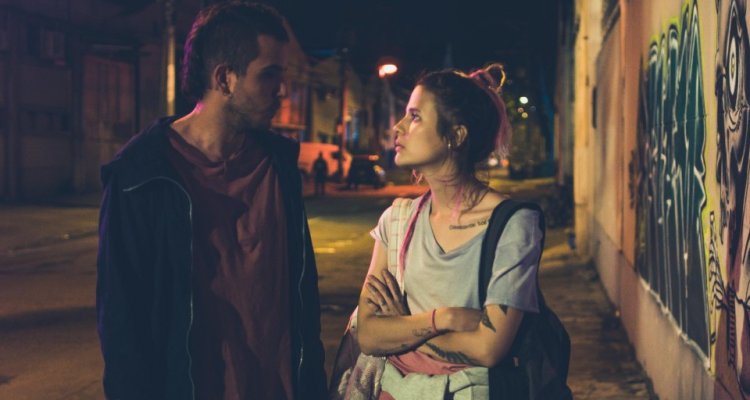How we’re heard, how we raise our voice to be recognized, will for many be one of the essential discoveries in the continually unfurling magnitude of 2020. For some it’s through social media, for others it’s marching in the street, but for Cris, in Catalina Arroyave Restrepo’s breezily street-level debut “Days Of The Whale,” it’s found in the rattle and color of a can of spray paint. While filmed before *gestures at the world* this coming-of-age tale brims with the recognizable, head-swimming mix of young love and adolescent rebellion, and the charge that comes from standing up for your beliefs.
So, what exactly is Cris rebelling against? Well, in the immortal words of Marlon Brando, “Whaddya got?” She lives with her recently divorced father, Julian (Chrisitan Tappan), and his new girlfriend, Valeria (Valeria Castaño Fajardo), in a very tidy, middle-class condo building. Even if they are often at odds, the strong and loving bond between Cris and Julian is never in doubt. But Cris has very little patience for Valeria, meeting her superficial and feeble attempts at understanding, friendship, or parenting with outright contempt. The condo certainly isn’t big enough for the three of them and their combustible friction, so Cris spends most of her time ditching school and roaming the streets of Medellin with Simon (David Escallón). With both of his parents out of the picture, Simon lives with his grandmother, and like Cris prefers to be anywhere but home. Cris and Simon share an easy affection, both intense and ephemeral, as these kinds of romances tend to go. But their strong connection is forged through graffiti, with the pair marking their days and nights with beautiful and vivid illustrations on any open stretch of concrete they can find.
Their loose days of ambling and art are soon under threat when a local street gang starts pressing the artists’ collective they belong to for protection money. Lucas (Carlos Fonnegra), who runs the space, prefers to take a cautious approach, uncertain about what might happen if they provoke the quick to anger wannabe gangsters. Simon, who previously rolled with the crew, is unbothered by their threats even as they become increasingly hostile; after all, he grew up with them. Meanwhile, Cris is caught between Lucas’ level-headed approach and a desire to do something to show the gang they can’t be pushed around. This streak of protest is inspired by Cris’ mother, Dora (Margarita Celene Restrepo), a journalist who has fled the country after her exposés threatened the criminal local order.
While the stakes are high, the spirit of “Days Of The Whale” is endearingly loose-limbed, in many ways recalling the similarly sun-kissed energy of Adam Leon’s “Gimme The Loot.” The threadbare plot doesn’t unfold so much as languorously stretch across the film’s almost invisible eighty-minute runtime. Effortlessly keeping the film from slipping into lethargy is the remarkable presence of Laura Tobón Ochoa as Cris. The newcomer is striking, delivering a performance of true breakout potential, measuring the desire to fight for a virtuous cause with a vulnerable tenderness, all wrapped up in an undeniable magnetism. It all works in helping Arroyae Restrepo maintain the feeling of days where afternoons bleed into nights and right into the next morning, although the vibe sometimes works against a story where violence is palpably looming. It also renders the cuts to a beached whale, slowly rotting in various parts of the city, a metaphor perhaps for the country’s long history of drug-fueled rule, as an even more heavy-handed than it is, jarring against the overall mood of the picture. However, cinematographer David Correa has an undeniable eye for Medellin, shooting the picture with a vibrancy that betrays a true love for the city.
“Days Of The Whale,” ultimately, doesn’t ascend to any grand climax or statement. One could ask for more meat on the story or wonder at the narrative strands that might have proven substantive, that were maybe left on the cutting room floor. But in a sense, the film’s ultimate accomplishment may be in capturing how even in the most seemingly inconsequential days of your youth, there are events that even as you leave them behind, will mark you forever. And in a year that has no shortage peaks, valleys, and weeks that blur between beauty, bliss, and outrage from moment to moment, those rhythms are undeniably familiar. [B]
“Days of the Whale” is available via Virtual Cinemas on July 24.

